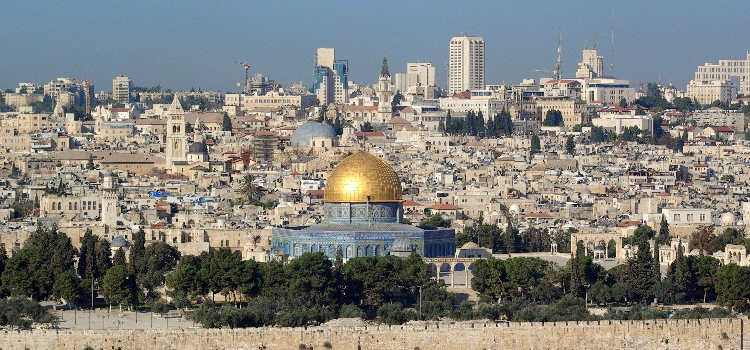
In 4 days, I’ll be flying overseas to the most historically significant nation in Christian history. I’ve wanted to visit Israel for some time now, but it’s one of those trip opportunities that tends to find you rather than vice versa.
I’ll be traveling as part of The Israel Experience College Scholarship, an annual program hosted by Eagles’ Wings with the stated vision of giving tomorrow’s leaders an educated heart for Israel. Regardless of your views on the modern state of Israel, it is widely understood that media presentations on the Palestinian-Israeli conflict account for some of the grossest breaches in the history of journalism. In an age where journalism has prostituted itself to corporate money and political influence, this conflict has somehow found a way to consistently elicit the lowest points in journalistic integrity. The Israel Experience’s vision is to remove the filter and cut through the rhetoric by taking students to the land itself, where they can observe what’s real and make their own conclusions. We’ll be meeting with Jews, Palestinian Christians, diplomats, and the “man on the street.”
I am very interested to see what I will find.
More Than History
Since my youth, I’ve always viewed the Jews as God’s chosen people. As I see it, they are not the chosen people of old. They remain, today, a covenant race. In Romans, Paul speaks of the Gentiles being “grafted in.” This analogy in no way indicates a replacement of the Jewish people with the Body of Christ at large. If anything, it does the opposite.
When I look at Israel and the Jewish people, my spirit sounds off. I don’t know how to explain it, but I just know in my spirit that they are significant. I am hoping to add some mental understanding to this during my visit.
In a spiritual sense, I never base my decisions on signs, but I do look for them. In the two years I’ve been in ministry school, I’ve heard probably around 200 sermons. Out of that number, only 1 has touched on the significance of Israel. Seriously… 1 sermon out of 200. As I was listening to pastor Michael Brodeur talk about the time of the Gentiles coming to a close, I received my official acceptance email as a scholarshipped participant in The Israel Experience 2014. If you didn’t catch that, I received my acceptance to visit Israel during the one hour in two years my school was discussing Israel.
Several weeks later, I was invited to my first Passover celebration, which as many of you know, occurred during the first blood moon of a tetrad this year. While I would label myself neither a prophet nor a mystic, the significance of these events is not lost on me.
References To Apartheid
In addition to the spiritual element, the “Christian” side of my trip, there is the reality of a historic conflict occurring right now in the relatively young state of Israel. As I mentioned before, there have been gross journalistic breaches on both sides of this conflict, and it can be extremely hard for those interested in truth to understand exactly what is going on.
One of the more recent terms being used to describe the Israeli-Palestinian conflict is that of “apartheid.” Editorials like this LA Times Op-Ed piece from Saree Makdasi, assert that Israel is treating Palestinians in the same way South Africa’s white minority segregated and oppressed black citizens prior to Nelson Mandela’s election in 1994.
- According to Makdasi, Israel is practicing apartheid based on the following.
- Denying a group of people the right to life and liberty
- Subjecting them to arbitrary arrest
- Expropriating their property
- Depriving them the right to leave or return to their country
- Preventing mixed marriages
Makdasi addresses the argument that Palestinians are not an actual race, but rather a collection of Arabs from widely differing national background, by saying that basing racial identity on race is simplistic… I have no clue what that means, but it sounds convenient.
Makdasi, of course, refuses to acknowledge Israel as a state, indicating an obvious bias towards the situation. The interesting thing about her argument is that according to this definition of apartheid, every state operating under Sharia law should be classified as an apartheid state. So even if we concede that the above points are current realities in Israel, why has the western world chosen to single out Israel?
Obviously, is there is a targeted dehumanization of Arab people occurring within Israel, that is a serious issue that needs to be addressed. In South Africa, black citizens were segregated against in public settings, unable to hold leaderships positions, and legally prevented from the rights that whites enjoyed. With just a cursory glance, it seems fascinating that their plight is being compared to Israel’s current conflict, for the following reasons.
- Arabs are not discriminated against under Israeli Law.
- Arabs are not legally prevented from holding government positions.
- In the 120 member Israeli parliament, there have been 69 elected Arab members since 1969.
Obviously, what is “legal” and what is actually practiced can be two separate realities. The lack of legal oppression, however, does ultimately seem to invalidate the notion of apartheid, even if unfair treatment does exist on some level.
I will be very interested to observe for myself. In South Africa, the casual observer was able to instantly recognize the segregation. It permeated every fabric of society, to such an extreme that “segregation” or “racism” just don’t adequately describe it’s place in history. This is an incredibly extreme allegation, and accordingly, it’s easily observable.
You’ll be hearing from me on this topic.
Understanding A Modern Conflict
This is a typical map used to discuss the Israeli-Palestinian conflict. As you can see, this rather large country of Israel seems to be allocating an ever-decreasing portion of land to the Palestinian people.
What interests me about this graphic is that it leads readers to believe there used to be a country called “Palestine,” which is, of course, entirely untrue. “Palestine” is a term historically used as a general reference for the above geographic area, similar to the “Middle East” or “Southeast Asia.” The area known as “Palestine” was part of the Ottoman empire from as early as the 1500’s until its dissolution in 1922, after which it became a British-controlled territory.
The other thing that interests me is the proportional sizing of this map. It makes Israel look quite large. In reality, Israel is only slightly larger than the state of New Jersey. I’ve provided a to-scale comparison below.
This is an extremely small area of land we are discussing. For contrast, this is the Arabic speaking portion of the Middle East, according to Arab Academy.
Notice how small Israel is in terms of both the Middle East and the Arabic corner of the world. Given that a country called Palestine has never existed, we are talking about a small fraction of nationally unclaimed territory being allotted to a new Jewish state based on historical occupancy.
Now obviously, in the case of resettlement and forced extraction, the size of the land matters little. If thousands of families were forced to up and move to make way for Jewish settlers, there is an obvious problem. But that seems to be another misnomer as well.
According the US Department of the Historian, The United Nation’s Resolution 181 divided Palestine into two states: one Arab and one Jewish. As you can see from the graphic below, the two states were to be equally divided, with the historically contested area surrounding Jerusalem remaining neutral under UN control.
No residents in any location were asked to relocate, but the predominantly Muslim nations surrounding this area were not pleased with the insertion of a Jewish state, and they violently opposed its creation through attacks on both Jerusalem and Tel Aviv. Over the next two decades, Jewish settlers continuously fought as many as five different Arab countries for the preservation of a Jewish state. By the end of the Six Day War in 1967, the Israeli army had not only preserved its UN granted territory, but had expanded its borders significantly.
The next part is interesting. Most of the news features today paint Israel as an arrogant nation hell-bent on oppressing Palestinians and refusing peace. But what happened to the above borders? Israel conceded over half of the above lands back to Arab nations as part of UN Resolution 242, with the promise that they would be peacefully recognized as a state by the surrounding countries.
These two decades of Israeli-Arab conflict also led to the existence of over 600,000 Palestinian refugees. Whether these Palestinians left Israel as the result of Israeli demands or Arab threats is a hotly debated historical question.
Regardless, there are several facts which aren’t disputed.
- The Arabs who became “Palestinian” refugees were not discriminated against by Jews prior to the wars.
- After the wars, surrounding Arab nations refused to allow these refugees to be absorbed into their significantly larger countries.
- Palestinian refugees are the only group in history to be referred to as “refugees” for three recurring generations.
While it’s trendy these days to picture Israel as the enemy of peace, few seem to be questioning the actions of Palestinian leadership.
For example, what happens to the extensive foreign aid being sent to the Palestinians’ acting government, the Palestinian Liberation Organization (PLO)? Between 2002-2011, an incredible $6.7 billion in aid was sent to Gaza Strip and West Bank refugees, a populace totaling no more than 5 million individuals. That amounts to $1,340 per person, and yet, views of the area reveal perpetual poverty, while hundreds of millions of dollars in explosives are launched into Israel every year.
Or how about Jordan revoking the citizenship of millions of Palestinians at the request of the PLO, cementing their status once again as refugees?
Even in terms of peace, PLO leaders have repeatedly rejected anything short of the original UN resolution, despite the Arab world’s complete rejection of that resolution in the two decades following its signing. Many leaders have publicly refused any solution that includes the inclusion of a Jewish state.
Some would say that “most Palestinians are interested less in the destruction of Israel than in establishing a proper Palestinian state.” The problem, it seems, when history is observed, is that Palestinian leadership does not feel the same way as the people they lead.When I look at the situation as a whole, it’s very difficult to believe the rhetoric, and it’s incredibly difficult to ignore the world’s history of committed anti-semitism.
Final Thoughts Before Departure
Throughout history, the Jewish people have been oppressed. From their time in Egypt to the Babylonian captivity, from being blamed and murdered for the Black Plague to annihilation in concentration camps, one need not look long to find yet another instance of radical hatred and violence towards this people group.
As Christians, we understand why this is. We understand the targeted attacks of the enemy against God’s chosen people. And here again, as a small fledgling state finds itself surrounded by the most violent religion known to mankind, the world has made David appear to be Goliath, and we’ve found a way, against all odds, to once again make anti-semitism socially acceptable.
Is Israel without fault? Certainly not. As I visit Israel, I will be reporting back on what I find. I am far more interested in ascertaining the truth than spreading any given ideology. If I find hatred and segregation, you will be sure to hear about it.
This article constitutes my understanding based on comparing and contrasting the information available. There are numerous holes in the “facts” dumped across our airways and trillions of dollars in oil money that explain how they got their.
I’m extremely skeptical of the demonized picture of Israel that seems to be all the rage these days, particularly in light of the forces at odds and the histories of those involved.
Check back for updates over the next two weeks.










Looking forward to hearing more from your trip! Thank you for your efforts to see things first hand and give a more accurate picture of the state of affairs in Israel.
Thanks Tim! It’s been amazing thus far. I’ll be posting again within the next day or two.
Comments are closed.